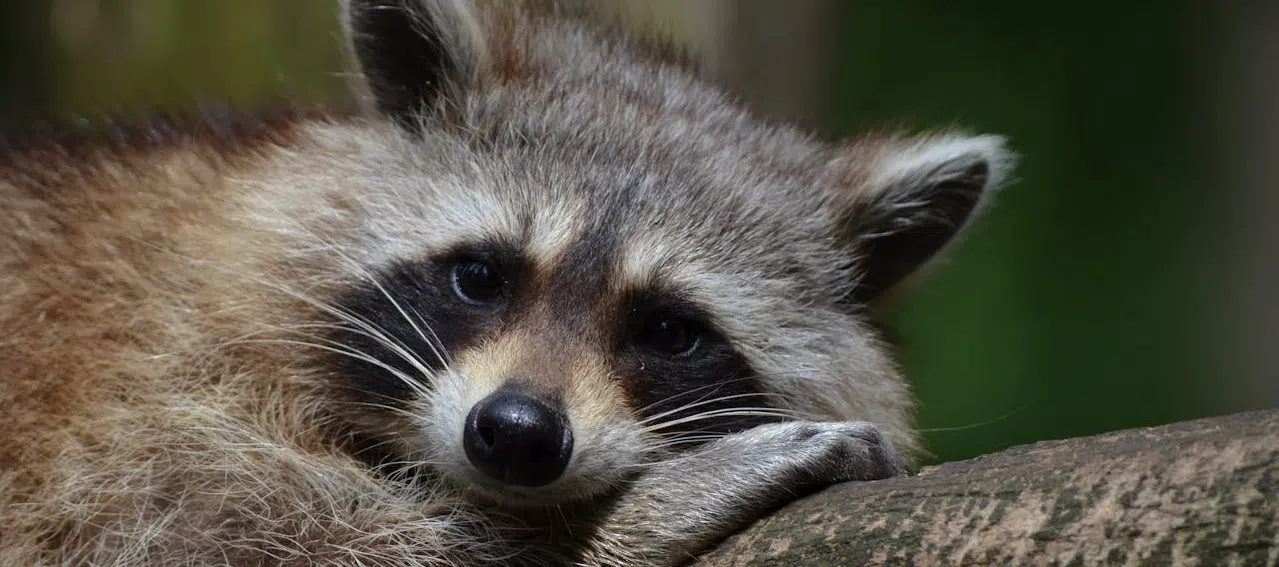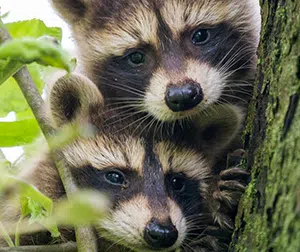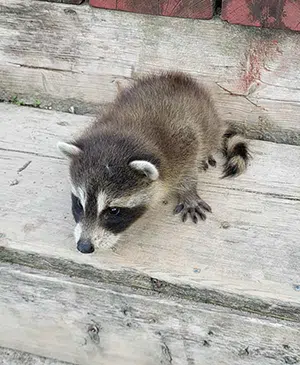Early summer is when you are most likely to encounter a raccoon family in or around your home or property. As the babies are becoming mobile and mother raccoon takes them to explore the outside world, you may hear more pronounced ruffling, thumping, and even cooing or screeching, particularly in the hours between dusk and dawn.

Raccoons give birth in early spring, generally to litters of an average of 4 kits. Your attic, chimney, crawl space, or any low-traffic outbuildings make for perfect raccoon dens. Baby raccoons are born hairless and blind and will be cared for 24/7 by their mother for the first 3-4 weeks of their lives. Adult raccoons are often regarded as mostly a nuisance, but adults and kits alike actually pose a serious threat to human health and property.
What Are the Health Risks Associated with Raccoon Litters?
Health risks extend to your family and your pets. Those include:
Raccoon Roundworm (Baylisascaris procyonis)
 This is a highly resilient parasitic worm found in raccoon feces and is transmitted by ingestion of microscopic eggs found in soil, dust, and contaminated surfaces. Children and pets playing outdoors are especially at risk.
This is a highly resilient parasitic worm found in raccoon feces and is transmitted by ingestion of microscopic eggs found in soil, dust, and contaminated surfaces. Children and pets playing outdoors are especially at risk.
Symptoms and Consequences:
- Ocular Larva Migrans (OLM) – vision loss, blindness;
- Visceral Larva Migrans (VLM) – organ damage (liver, brain, lungs);
- Neural Larva Migrans (NLM) – severe neurological damage, coma, death (especially in children).
Leptospirosis
Leptospirosis is a bacterial disease spread through raccoon urine and is transmitted by contact with contaminated water or soil; this could be via open cuts, mucous membranes, or ingestion.
Symptoms and Consequences:
- Flu-like symptoms;
- Can lead to kidney damage, liver failure, and meningitis.
Rabies (though less common, still a significant risk)
Rabies is a viral infection affecting the nervous system. Transmission occurs from saliva, through bites or through contaminated water.
Symptoms and Consequences:
- Early signs mimic flu symptoms, including fever, headache, and general weakness;
- As the disease progresses, more distinct neurological symptoms appear, including anxiety, confusion, hallucinations, and potentially paralysis;
- Aversion to water (hydrophobia) and excessive salivation can also occur;
- Fatal, if not caught and treated early.
Other Potential Pathogens and Pests:
- Fleas, Ticks, and Mites
Can lead to other diseases (e.g., Lyme disease) in humans and pets; - Bacteria
Bacteria such as Salmonella and E. coli can be transmitted via fecal contamination; - Fungal Spores
Spores such as Histoplasmosis can be released from disturbed droppings.
Common Areas for Raccoon Dens and Litters
Residential Properties:
 Attics, wall voids, chimneys, basements;
Attics, wall voids, chimneys, basements;- Under decks, sheds, woodpiles, compost bins;
- Garages and crawl spaces.
Commercial/Industrial Properties:
- Rooftops, ventilation systems, abandoned areas;
- Warehouses, storage facilities, loading docks;
- Undersides of portable structures or equipment.
Structural Damage Caused by Nesting Mothers and Raccoon Litters
- Nesting raccoons often tear insulation, chew wires, damage HVAC ducts, or destroy roof vents.
- A litter site can become a permanent scent-marked zone and attract future infestations.
- Damage is more severe and costly when litters are involved due to prolonged nesting, possibly even throughout the following winter.
Commercial and Residential Risks
- Residential:
- Health risks to homeowners, children and pets;
- Long-term attic contamination (urine and feces corroding insulation, wood and drywall);
- Difficulty in reselling property due to wildlife issues.
- Commercial/Industrial:
- Health inspection risks, especially the in food, hospitality, and healthcare sectors;
- Disruption to daily operations;
- Potential liability if employees or customers fall ill or encounter hazards.
Why Ignoring a Raccoon Litter Escalates the Problem
- Mothers are extremely territorial and will return to raise more litters;
- Female offspring often return to the same nesting site once mature — creating a multi-year infestation cycle;
- Delaying action allows health hazards to multiply, often hidden from sight until damage is extensive.
The Dangers of DIY Clean-up
- Stirring up dust containing roundworm eggs or fungal spores and risking accidental inhalation;
- Direct contact with contaminated materials or raccoon droppings without proper PPE and safety protocols;
- Inadequate disinfection during raccoon feces clean-up, leaving residual risks;
- The risk of an encounter and confrontation with the raccoon itself.
Professional Protocols for Raccoon Litter Remediation
- Importance of specialized equipment such as HEPA vacuums, respirators, and protective suits;
- Thorough removal of all contaminated materials (e.g., insulation, drywall, floor boards, etc.);
- Multi-stage disinfection and deodorization processes;
- Safe disposal of hazardous waste.
What You Should Do About Raccoon Litters
If you have a raccoon den in your attic, you need to remove the mother raccoon and her babies as soon as possible. Prolonging action will compound the damage to your home and increase the risk of disease to your family and pets.
The 'Usual' Way to Remove Raccoons
- Trap and Release within One Kilometer of the Capture Location
This is the process used by most raccoon removal services in Toronto. It is perfectly legal - and ineffective. The majority of raccoons will return and forcefully regain access to your home. Meanwhile, the spread of disease is helped, rather than hindered.
Encourage Mother Raccoon to Move her Family Elsewhere
- Male Raccoon Urine
Using male raccoon urine scent, you can send momma raccoon plus babies on their way and abandon the den in your home or commercial structure. Male raccoons will kill kits in order to mate with the female again, so the scent of male urine will have the female packing up and leaving in a hurry to protect her offspring.
Permanent Raccoon Removal
- Legal, Ethical, and Humane Removal
Hawkeye Bird & Animal Control is licensed and authorized to capture and permanently remove (humanely euthanize) raccoons. The breeding and denning cycle stops here.
Hawkeye: Your Exclusive Partner in Eliminating Raccoon Litter Dangers in the GTA
Hawkeye Bird & Animal Control has a 35+ year history of successful raccoon removal and control across the GTA - Permanently and Guaranteed. If you suspect a raccoon den on your property, don't delay - book a consultation today. The longer you wait, the more extensive the damage and costs will be. Contact Hawkeye today and learn more about raccoon nest removal or how to get rid of raccoons.
Our Raccoon Litter Removal Services are available in Toronto, Mississauga, Brampton, and across the GTA.
Related Articles: https://hawkeye.ca/blog/raccoon-infestations-in-abandoned-or-vacant-properties














